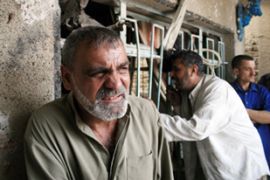White House mourns US troop toll
President “grieves” losses following news that US toll in Iraq has reached 4,000.

| Your Views |
The death toll reached 4,000 following the deaths of four soldiers in a roadside bomb attack in the south of the Iraqi capital, Baghdad, on Sunday.
In the most deadly attack, 13 Iraqi soldiers were killed when a suicide bomber drove a vehicle packed with explosives into a security checkpoint in the northern city of Mosul.
| In Focus |
|
|
Obama said on Monday he reacted “with great sadness” to the news that “we have reached another grim milestone in Iraq, with at least 4,000 of our finest Americans having been killed”.
| In video | ||
|
At least 97 per cent of the US military deaths came after Bush announced the end of “major combat” in Iraq on May 1, 2003.
Since the US military toppled Saddam Hussein, Iraq’s former president, it has faced a violent anti-occupation campaign and witnessed violence between the country’s sectarian communities.
More than 80 per cent of soldiers killed have died in attacks by al-Qaeda in Iraq, Sunni and Shia fighters, icasualties.org said.
The remainder died in non-combat related incidents.
Around 40 per cent of those killed were struck by roadside bombs, according to the website, making these weapons the main cause of fatalities.
Small-arms fire was the second biggest killer, the website said, with helicopter crashes, ambushes, rocket attacks and suicide bombings also the cause of many deaths.
Vietnam was the deadliest war for the US military, apart from the two world wars, with 58,000 soldiers killed between 1964 and 1973, an average of 26 a day.
On average, just over two US soldiers die each day in Iraq.

